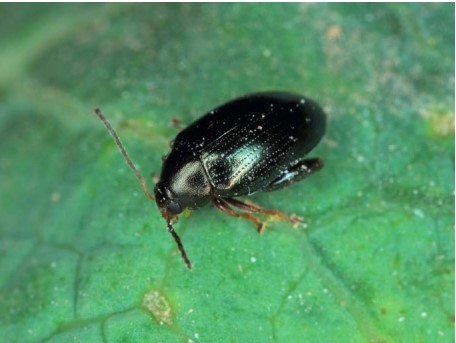Could a Biologicals Pipeline Accelerator and Demonstrator be the conduit to improving the uptake of novel crop protection products within UK agriculture?

CHAP Innovation Network Lead, Dr Harry Langford and Research Associate, Dr Jemma Taylor, are part of a team that has developed a business case proposing just that. Through CHAP’s New Innovations Programme, which brings together skilled practitioners and technical specialists to define critical realworld challenges, potential ideas for overcoming areas of market failure are scoped. From this, business cases are formulated with a view to overcoming a shared sector challenge, in this case, the adoption of biological products. Reporting on the business case, Dr Langford and Dr Taylor provide sector insight, share the proposed solution and draw in knowledge from industry advocates of biological plant protection.
The why, the reason
Biological plant protection products are a distinct group within the crop protection market, set apart in that the active substances are derived from living organisms. This can encompass pest control by using non-toxic mechanisms such as pheromones in conjunction with traps, predatory macroorganisms, microorganisms as the active ingredient, or substances produced by plants, either naturally or through targeted modification.
They are recognised as having significant potential to deliver crop protection outcomes in a sustainable way, meaning they are ideally placed to deliver solutions in systems where traditional synthetic products can’t or should not be used, such as in organic farming and regenerative agriculture. With the increasing interest in these alternative farming methods, biologicals have a bright future.
Biologicals can, and are already, being used across a wide range of crops grown worldwide, as they can help to improve quality and yield. They are used most effectively as part of an integrated pest management (IPM) system to complement other products and methods designed to keep the crop as healthy and productive as possible. Many biologicals can be applied using the same equipment as regular crop protection products, increasing their uptake and application by farmers. However, they do often have specified storage conditions and application times and rates, which users need to adhere to, to ensure efficacy.
The biologicals market can be segmented by type (macro-organisms, microbials and biochemicals), use (biofungicides, bioinsecticides, and bionematicides), or mode of application (foliar spray, soil application and seed treatment) to help apportion the marketplace and identify comparables. It is a growing global market due to a condensed regulatory timeline, reduced chemical residues and environment persistence, and compatibility with alternative farming methods such as organic and regenerative agriculture. Today the market is worth about $4.3bn, or £3.1bn.
In the UK, a growing number of established companies, SMEs and startups are investing in this market. This is encouraging, due to growing concerns around the efficacy of more traditional crop protection solutions due to resistance issues, synthetic product revocations and the decline in new products reaching the market, as well as ongoing environmental concerns.
Therefore, the acceleration of the biologicals market provides a significant opportunity to reduce the environmental impact of crop protection, improve IPM, and drive the development of a new sustainable skillset within farming. However, the challenges for biologicals can include variable effectiveness, unstable formulations and a different grower mindset to their useage. Consequently, small companies and research institutions can struggle to develop new biological products from discovery through to market launch.
We want to see what role CHAP could play in overcoming these challenges
Analysing the market
There are a number of public and private sector advisors and facilities that help support biological product development and testing. Challenges here include the fact that they can be shared with other sectors, underutilised or suffering from a lack of exposure, or they are not focused on the optimisation of biologicals at a farm scale within the context of IPM.
Understanding why these do not fulfil the market need in stimulating scale-up and commercialisation needs further investigation, but other factors could include a lack of capacity, high charges against a company’s limited resources, or a lack of awareness of what facilities are available.
Others who are operating in this area are:
• Consultants who are specialist regulatory advisors, e.g. Enviresearch
• Research and scale-up facilities with specialist equipment, e.g. CPI and IBiolC, along with industrial biotechnology facilities
• Business advisors – public and private, e.g. Cambridge Consultants
• Public sector providers of grant funding, e.g. Innovate UK
• Venture capitalists and business angels, e.g. Yield Lab
• Associations promoting relevant applied research, e.g. AAB
There are already a number of public sector advisory and support organisations, and/or those who provide grants for this area. With this in mind, there is an opportunity for CHAP to establish the core of a service which would provide advisors to help companies advance through the new product development pipeline, and direct them to resources and facilities that are available either within CHAP or elsewhere, to help them to progress. This would enable a complete pipeline provision:
• Small scale production facilities and equipment
• A network of field and farm trial sites optimised for biologicals
• Advice on research and testing design
• Guidance on regulatory submissions and evidence
• Advice on further research and technology development
• Grant funding for future development
• Business and commercial training
• Overall advisor to progress pipeline
• Lab and testing equipment
• Consultants for regulatory advice
• Grant and loan funds for specific projects.
The case for change
During an assessment of the UK crop protection industry, CHAP identified three main areas of market failure:
• Funding: Risk for developers of new biological IPM products and systems, along with challenges demonstrating efficacy and best practice, leading to difficulties in securing funding to move products along the ‘ pipeline’.
• Understanding: Lack of clear information, both for SME product developers, in addressing development and demonstration challenges, both to move new IPM products and systems along the pipeline, and to help end users understand the product and system choice.
• Tailoring: Global, large market focus hinders the development of biological solutions tailored to local situations and smaller markets.

Alongside these market failures, several barriers were identified which slow or prohibit progress with the development, production and utilisation of biological crop protection products. The market for biological control products may be on the rise, but challenges remain for the numerous SMEs developing them, especially the availability of independent facilities for scale-up of production. This is particularly true for certain product derivatives such as fungi, which require dry-mill biorefining. Beyond production, barriers to adoption include demonstrating biologicals’ efficacy, and a more complex use strategy with many best used in association with other products or IPM strategies (but with little knowledge and information available to support users).
As a result, new biologicals often either stall and fail, or are purchased by larger companies during their early development, with limited benefit either to the original investors or to the UK economy. These barriers – coupled with the high cost to growers for biopesticides when compared to synthetic pesticides – restrict their adoption in more conventional broad-acre farming systems. This may ultimately limit the growth of the global biopesticides market. As the new agriculture bill and ELMS regulations come into force in the UK, changes will be implemented to encourage more diverse, sustainable and environmentally benign farming systems.
This will only add to the highly complex, multi-dimensional space of the crop protection ‘environment’, which is trying to interface between ‘science’, ‘agricultural technologies’, ‘crop management practices’, ‘environmental impact’, and an ever-growing public scrutiny of the environment and public health. This is concerning as it is already difficult for stakeholders in the sector to keep up-to-date with legislation and evolving products and solutions, and to therefore make good decisions about what products to use and where the business opportunities are.
The majority of UK farmers have a risk-averse view of pest management and undertake ‘insurance’ applications; in fact, pesticide applications on UK crop land rose 24% from 2000 to 2016. Setting up an effective IPM strategy is important when trying to deal with production risks, but with the multitude of traditional and new crop protection tools and technologies available, and the complexity and clarity of the information surrounding IPM programmes, this itself can be a major barrier to the correct and effective adoption of IPM.
To address this CHAP, in discussion with stakeholders from across the sector, created a problem statement to summarise the issues and opportunities for which a solution could then be developed. Risk prevents truly disruptive crop protection solutions from being developed and delivered, particularly as part of an integrated system. Manifold risks operate across the product development and regulatory pipeline, in accessing and utilising real-time data to underpin user decision-making, and in designing systems-integratable solutions.
Solution – a collaborative way forward
To address this problem statement, CHAP proposes the development of a ‘Biologicals Pipeline Accelerator and Demonstrator’ in partnership with key stakeholders. This would increase the number of new biological products successfully reaching market, and improve the effective integration of biologicals into existing and novel IPM strategies, diversifying their use cases to include open field agriculture.
The Biologicals Pipeline consists of two parts
• The ‘Accelerator’ – a brokering service to link SMEs to expertise and facilities along the development pipeline, with expertise in specific activities, such as scale-up of production, adjuvant/inert material specialists, biological and toxicological testing, regulatory compliance, product registration, investment and funding. This will provide a one-stop-shop for innovation in biologicals, from registration and compliance through to scaleup and financing.
• The ‘Demonstrator’ – a network of field and farm trial sites optimised for biologicals and IPM, providing two tiers of demonstration trials: efficacy trials of new products, singularly and in combination; and IPM optimisation trials to develop standard operating procedures for biological IPM solutions. This will allow product developers to determine and, if necessary, reduce the variability of their product’s efficacy, as well as allowing application mode and delivery to be optimised within a commercial IPM setting. As such, the ‘Demonstrator’ will help to overcome technical limitations of biological products during the product-development pipeline, and showcase the efficacy of products within optimised IPM systems, helping to de-risk these products and systems for the end-user.
After demonstrating a successful service, the Biologicals Pipeline Accelerator and Demonstrator could expand further, via strategic capital infrastructure investment, to provide supporting equipment where strong market need is evidenced. It is anticipated that primary users of the Pipeline will be SMEs at an early stage of biological product development, who are seeking to advance products through the pipeline towards the market, along with researchers in universities and research institutes at an early stage of biologicals source or product development. Contract researchers may also find it beneficial.
CHAP hopes that the Biologicals Pipeline Accelerator and Demonstrator will benefit farmers and anyone in the agricultural sector who uses the novel products that come out of the Pipeline, as well as benefiting wider society due to more sustainable food production and a resilient farming sector.
